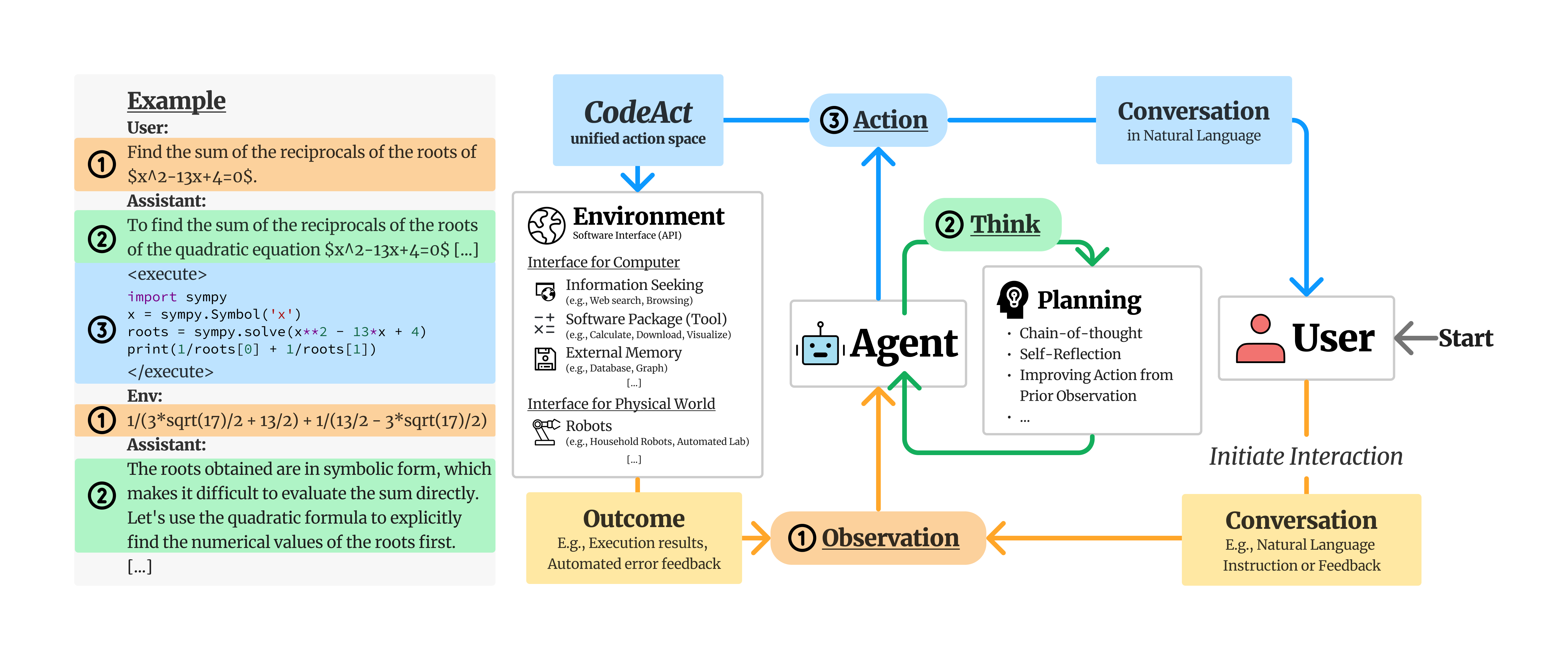File size: 3,837 Bytes
bafe398 19e93a0 bafe398 19e93a0 bafe398 |
1 2 3 4 5 6 7 8 9 10 11 12 13 14 15 16 17 18 19 20 21 22 23 24 25 26 27 28 29 30 31 32 33 34 35 36 37 38 39 40 41 42 43 44 45 46 47 48 49 50 51 52 53 54 55 56 57 58 59 60 61 62 63 64 65 66 67 68 69 70 71 72 73 74 75 76 |
---
license: apache-2.0
datasets:
- xingyaoww/code-act
language:
- en
pipeline_tag: text-generation
tags:
- llm-agent
---
<h1 align="center"> Executable Code Actions Elicit Better LLM Agents </h1>
<p align="center">
<a href="https://github.com/xingyaoww/code-act">💻 Code</a>
•
<a href="https://arxiv.org/abs/2402.01030">📃 Paper</a>
•
<a href="https://huggingface.co/datasets/xingyaoww/code-act" >🤗 Data (CodeActInstruct)</a>
•
<a href="https://huggingface.co/xingyaoww/CodeActAgent-Mistral-7b-v0.1" >🤗 Model (CodeActAgent-Mistral-7b-v0.1)</a>
•
<a href="https://chat.xwang.dev/">🤖 Chat with CodeActAgent!</a>
</p>
We propose to use executable Python **code** to consolidate LLM agents’ **act**ions into a unified action space (**CodeAct**).
Integrated with a Python interpreter, CodeAct can execute code actions and dynamically revise prior actions or emit new actions upon new observations (e.g., code execution results) through multi-turn interactions.

## Why CodeAct?
Our extensive analysis of 17 LLMs on API-Bank and a newly curated benchmark [M<sup>3</sup>ToolEval](docs/EVALUATION.md) shows that CodeAct outperforms widely used alternatives like Text and JSON (up to 20% higher success rate). Please check our paper for more detailed analysis!

*Comparison between CodeAct and Text / JSON as action.*

*Quantitative results comparing CodeAct and {Text, JSON} on M<sup>3</sup>ToolEval.*
## 📁 CodeActInstruct
We collect an instruction-tuning dataset CodeActInstruct that consists of 7k multi-turn interactions using CodeAct. Dataset is release at [huggingface dataset 🤗](https://huggingface.co/datasets/xingyaoww/code-act). Please refer to the paper and [this section](#-data-generation-optional) for details of data collection.

*Dataset Statistics. Token statistics are computed using Llama-2 tokenizer.*
## 🪄 CodeActAgent
Trained on **CodeActInstruct** and general conversaions, **CodeActAgent** excels at out-of-domain agent tasks compared to open-source models of the same size, while not sacrificing generic performance (e.g., knowledge, dialog). We release two variants of CodeActAgent:
- **CodeActAgent-Mistral-7b-v0.1** (recommended, [model link](https://huggingface.co/xingyaoww/CodeActAgent-Mistral-7b-v0.1)): using Mistral-7b-v0.1 as the base model with 32k context window.
- **CodeActAgent-Llama-7b** ([model link](https://huggingface.co/xingyaoww/CodeActAgent-Llama-2-7b)): using Llama-2-7b as the base model with 4k context window.

*Evaluation results for CodeActAgent. ID and OD stand for in-domain and out-of-domain evaluation correspondingly. Overall averaged performance normalizes the MT-Bench score to be consistent with other tasks and excludes in-domain tasks for fair comparison.*
Please check out [our paper](TODO) and [code](https://github.com/xingyaoww/code-act) for more details about data collection, model training, and evaluation.
## 📚 Citation
```bibtex
@misc{wang2024executable,
title={Executable Code Actions Elicit Better LLM Agents},
author={Xingyao Wang and Yangyi Chen and Lifan Yuan and Yizhe Zhang and Yunzhu Li and Hao Peng and Heng Ji},
year={2024},
eprint={2402.01030},
archivePrefix={arXiv},
primaryClass={cs.CL}
}
```
|